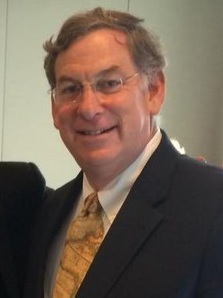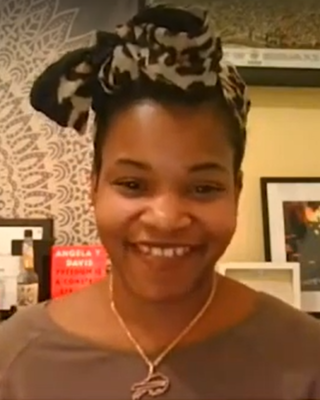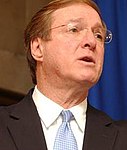
The Conservative Party of New York State is an American political party founded in 1962 following conservative dissatisfaction with the Republican Party in New York. Running on the Conservative Party line, James L. Buckley won election to the U.S. Senate in 1970 and served for one term. Since 2010, the party has held "Row C" on New York ballots—the third-place ballot position, directly below the Democratic and Republican parties—because it received the third-highest number of votes of any political party in the 2010, 2014 and 2018 New York gubernatorial elections. The party is known for its strategy of attempting to influence the Republican Party in a more conservative direction.

James Donald "Jimmy" Griffin was an American politician who served in the New York State Senate and then for 16 years as the Mayor of Buffalo, New York (1978–93). He later returned to public life serving as a member of the Buffalo Common Council.

Samuel Polen Katz is an American politician from Philadelphia, Pennsylvania. He was the Republican nominee for Mayor of Philadelphia in 1999 and 2003, nearly winning the election in the overwhelmingly Democratic city. His loss to the controversial John F. Street was covered in the documentary The Shame of a City.

Anthony M. Masiello is an American politician and former basketball player who served as Mayor of Buffalo, New York from 1994 to 2005. Prior to being mayor, he served as a member of the New York State Senate. He is currently president of Masiello, Martucci and Associates, a Buffalo-based lobbying firm.

Byron William Brown II is an American politician who is the current mayor of Buffalo, New York. He has served as Buffalo's 62nd mayor since January 2006, the City's first African-American mayor and longest serving mayor. He previously served Western New York as a member of the New York State Senate and Buffalo Common Council. He is the first African-American politician elected to the New York State Senate to represent a district outside New York City and the first member of any minority race to represent a majority-white New York State Senate district.
Kevin P. Gaughan is an attorney and an advocate of government reform, in particular for the establishment of regional government and regional consciousness within the Buffalo-Niagara region, which encompasses the cities of Buffalo, New York and Niagara Falls, New York, their suburbs and surrounding rural areas.

The 2010 New York gubernatorial election was held on Tuesday, November 2, 2010. Incumbent Democratic Governor David Paterson, elected as lieutenant governor in 2006 as the running mate of Eliot Spitzer, initially ran for a full term but dropped out of the race. Democratic New York Attorney General Andrew Cuomo defeated Republican Carl Paladino to become the next governor of New York.

Jane Lewis Corwin is an American politician and businesswoman who currently serves a Commissioner of the International Joint Commission for United States and Canada. She previously served as a Republican Party member of the New York State Assembly from 2009 to 2016. She represented the 144th Assembly District which covers parts of Erie and Niagara counties. Corwin was also the Republican Party nominee in the special election held on May 24, 2011, to fill Western New York's 26th district seat in the U.S. House of Representatives previously held by Republican Chris Lee. She faced three other candidates in the election; losing to Democrat Kathy Hochul 47 percent to 42 percent.
An election for mayor of the City of Lancaster in Pennsylvania was held on November 3, 2009. Incumbent Mayor Rick Gray, a Democrat, defeated challenger Charles W. "Charlie" Smithgall, a Republican by 313 votes, out of 7,261 cast.

The 2010 congressional elections in New York were held on November 2, 2010 to determine representation from the state of New York in the United States House of Representatives. New York had 29 seats in the House. Representatives are elected to two-year terms.

The 2014 Massachusetts gubernatorial election took place on November 4, 2014, to elect the Governor of Massachusetts, concurrently with the election of Massachusetts' Class II U.S. Senate seat, and other elections to the United States Senate in other states and elections to the United States House of Representatives and various state and local elections.

Michael P. "Mickey" Kearns is an American politician who serves as Clerk of Erie County, New York. Kearns previously represented the 142nd New York State Assembly District, which spans South Buffalo, half of the city of Lackawanna, West Seneca and Orchard Park, from 2012 to 2017; he has also served on the Buffalo Common Council. Kearns was elected Erie County Clerk in a 2017 special election.

The 2014 New York gubernatorial election took place on November 4, 2014. Incumbent Democratic Governor Andrew Cuomo sought re-election to a second term in office, though incumbent Lieutenant Governor Robert Duffy did not seek re-election. Cuomo and his running mate, former U.S. Representative Kathy Hochul, won contested primaries, while Republican Rob Astorino, the Westchester County Executive, and his running mate were unopposed for their party's nomination. Astorino and Moss were also cross-nominated by the Conservative Party and the Stop Common Core Party.

The 2013 election for Mayor of Buffalo, New York took place on November 5, 2013. Two-term incumbent Democrat Byron Brown won reelection, defeating Republican Sergio Rodriguez.

The 2005 Buffalo Mayoral Election took place on November 8, 2005. After incumbent Anthony M. Masiello, a Democrat, announced on April 29, 2005, that he would not seek a fourth term as mayor, a field of several Democratic candidates emerged, from which New York State Senator Byron Brown emerged victorious in the primary election. In the general election, Brown went on to defeat Republican challenger Kevin Helfer, former member of the Buffalo Common Council for the University District, as well as two minor-party candidates. Buffalo's 2005 mayoral election is notable as the first in the city to be won by an African-American candidate.

Nicholas A. Langworthy is an American politician serving as the U.S. representative for New York's 23rd district since 2023. He also chairs the New York State Republican Committee. Langworthy was named chair of the committee in July 2019 after having chaired the Erie County, New York Republican Committee since 2010. He is the youngest state chair in party history.

A special election was held to fill the remainder of the term in the United States House of Representatives for New York's 27th congressional district in the 116th United States Congress. Incumbent Republican Representative Chris Collins resigned from the House effective October 1, 2019, following his guilty plea to federal insider trading charges. The election was originally scheduled for April 28, 2020, but was postponed until June 23, 2020, due to the COVID-19 pandemic.

The 2021 Buffalo mayoral election was held on November 2, 2021. Democratic Mayor Byron Brown won his fifth-term in office as a write-in candidate. Brown's victory marked the first time since 1985 that Buffalo did not elect the Democratic nominee for mayor.

India B. Walton is an American political activist and nurse. She defeated incumbent Mayor Byron Brown in the Democratic Party primary for the 2021 election for mayor of Buffalo, New York, before losing to Brown in the general election, where he ran as a write-in candidate.

The Buffalo mayoral election of 1977 took place in Buffalo, New York, USA, on November 8, 1977, and resulted in the election of Jimmy Griffin to his first term as mayor.





















